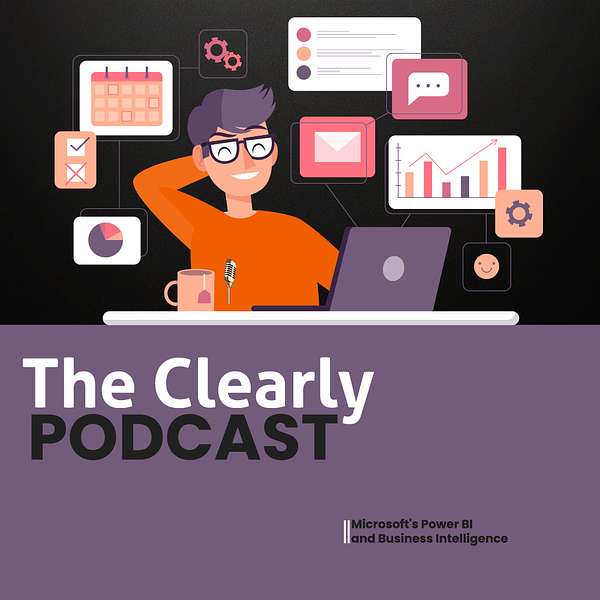
The Clearly Podcast
The Clearly Podcast
The Democratisation of Data - A Revolution in Analytics, or Marketing BS?
In this episode of the Clearly Podcast, we discuss the concept of democratizing data within organizations. The key points covered in the conversation include:
Definition and Critique: The term "democratization of data" refers to making data accessible to a wider group within an organization. The hosts critique the term, suggesting it often sounds like marketing jargon meant to sell software licenses.
Traditional Data Access: Historically, data access has been siloed within departments such as accounts or sales. The idea behind democratization is to break down these silos and allow broader access to data.
Challenges and Risks: Several challenges come with democratizing data, including data security, proper cataloging, and understanding the data. There are risks of data leaks and the complexity of managing access across different systems.
Self-Service and Citizen Developers: The conversation touches on the issue of self-service BI and citizen developers. While empowering users to create their own reports and handle data sounds appealing, it can be distracting from their primary roles and is often more complicated than anticipated.
Action Plan for Democratization: To achieve democratization effectively, organizations should start with improving data literacy. Employees should understand what data means, how to handle it responsibly, and the implications of data misuse.
Governance: Implementing proper governance is crucial. This involves identifying key questions that need answers, determining the necessary data sources, and applying security measures. A phased approach is recommended to gradually expand access.
Final Thoughts: The discussion emphasizes the importance of starting small and ensuring that everyone in the organization understands the data they are working with before rolling out broader data access initiatives.
Overall, the episode highlights the complexities and considerations involved in democratizing data, urging a thoughtful and phased approach to implementation.
You can download Power BI Desktop from here.
If you already use Power BI, or are considering it, we strongly recommend you join your local Power BI user group here.
To find out more about our services and the help we can offer, contact us at one of the websites below:
UK and Europe: https://www.clearlycloudy.co.uk/
North America: https://clearlysolutions.net/
Edited transcript to be concise
Andy:
Welcome to the Clearly Podcast. My name is Andy Clark.
Shailan:
I'm Shailan Chudasama.
Tom:
And I'm Tom Gough.
Andy:
We're wrapping up the season with a bit of a rant about the phrase "democratization of data." What does it mean, and how should people approach it seriously?
Tom:
If you're using that phrase with a straight face, you're probably a bit of a [bleep]. It's thrown around a lot, but what does it actually mean?
Andy:
Exactly. Where does this term come from, and what does it imply
Tom:
It broadly means giving wider access to data within an organization. Traditionally, data was siloed in departments like accounts or sales. The idea now is to give everyone access to data so they can do their own analysis.
Andy:
So, what are the risks of democratizing data?
Shailan:
There are many risks, like data security, understanding the data, and proper cataloging. Organizations talk about being data-driven, but without proper governance and understanding, it can become chaotic.
Tom:
The challenge with self-service data access is that people are expected to handle data analysis alongside their main jobs, which can be distracting. This ties into the issue of citizen developers, where non-IT staff are expected to take on IT roles.
Andy:
Is this just a buzzword to sell more licenses?
Tom:
It does seem like a sales tactic. Organizations lock into long-term subscriptions with the promise of democratized data, but they often struggle to implement it effectively.
Shailan:
Yes, the dream of self-service BI is sold, but the reality is much harder to achieve. Proper data governance and phased approaches are essential.
Andy:
So, if someone wants to achieve this, what’s a sensible action plan?
Tom:
Start with data literacy. Teach people what data means and how to handle it responsibly. This includes understanding the risks of data leaks. Build this foundation before investing in new tools.
Andy:
What about governance, Shailan?
Shailan:
Governance should be phased. Identify key questions you want to answer and the data sources needed. Apply security and governance measures to these sources and gradually expand.
Andy:
Alright, I think we've covered everything. Any final thoughts?
Tom:
Data literacy and proper governance are key. Don't get lost in buzzwords.
Shailan:
Agreed. Start small, and ensure everyone understands the data they are working with.
Andy:
Excellent. We’ll be back in April. Maybe we can do some live recordings when I visit the UK. Thanks for listening, everyone. Goodbye.
Tom:
Bye.
Shailan:
Bye.